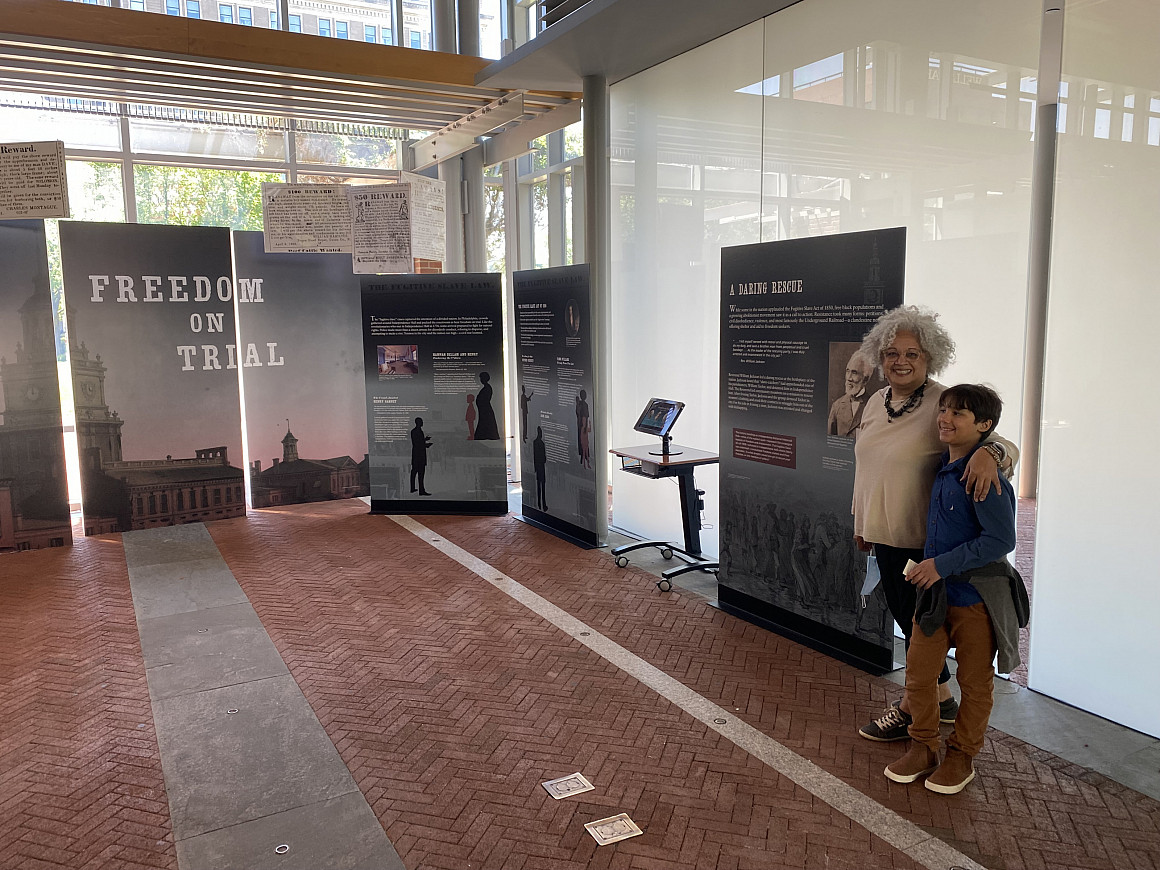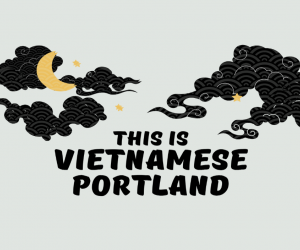main content Family History as American History
Valerie White, L&C’s ombudsperson, shares her family’s history as Black abolitionists in an exhibit at Liberty Bell Center in Philadelphia and in an upcoming book.

by Mackenzie Kier BA ’26
As Lewis & Clark’s ombudsperson, Valerie White is accustomed to listening, gathering information, questioning, and providing perspective. Over the last few years, she’s been applying these skills to a more personal project: a detailed family history that intersects with U.S. history.

White recognized the historical importance of Reverend Jackson’s story and wanted to share it with a broader audience. In November 2021, she reached out to the National Park Service with an idea for an exhibit. The result is Freedom on Trial, a temporary exhibit that is currently on display through May 28, 2023, at Liberty Bell Center, located in Philadelphia’s Independence National Historical Park. The exhibit addresses local resistance to the Fugitive Slave Act of 1850 and features Reverend Jackson’s daring rescue. Video interviews with Valerie White are part of the exhibit.
White, who is also writing a book on the subject, hopes others will, as the exhibit says, “be inspired by the courage of freedom seekers and the power of family and community.”
We caught up with White to learn more about the many facets of her family history project.
Let’s go back to the beginning. How did this project come about?
I grew up with family stories all around me. They were fascinating. For example, I always heard, “Don’t go down cella’”—meaning don’t go in the basement. I was told this because it was where the fugitives trying to escape slavery used to hide. It was part of the Underground Railroad. Well, by the time I was a kid, there hadn’t been anybody in the cellar for nearly 100 years. But you could just feel the history of it.

But then life got in the way, so I put the project aside for a while. In 2018, when Reverend Jackson would have turned 200, I went to work getting his hometown [New Bedford, Massachusetts] to recognize his birthday as Reverend William Jackson Day. That’s when I really started putting the pieces together … that was the launch of it. I had already started talking about him and his wife, Jane, and how they intersected with parts of U.S. history before that. And so I was starting to dabble in it because people were interested. It just grew from there and eventually became the exhibit.
The book project came about when a book publisher reached out to me through a friend. He called and said, “I don’t even need to see anything in writing from you. I want to do this book. I want to be your publisher.” When a publisher comes to you, it’s like, “Well, maybe I’ll start writing that book sooner than I had thought!”
What was your role in the exhibit’s development?
I worked directly with National Park Service ranger Michael Doveton, who was the liaison with the exhibit developers. We spent a lot of time on the phone, because he didn’t know anything about my family. It was Michael’s idea for me to record three separate short videos talking about the importance of family history and of the story itself.
Why has it been important to you to delve into your family history?
For me, it’s their place in U.S. history. As a family member, I had access to things I wanted to know more about … we had Reverend Jackson’s hat, we had family letters. So as a family member, as a descendant, as a great-great-granddaughter, I grew up feeling like they were still alive based on the way our family talked about them.

As I got older, and as I taught and told their story to my students [as a graduate school professor], I realized this is an American story. This isn’t just our family story. It’s important for others to know what it really took—and the toll that it took on people—to work toward freedom.
But what really got me going was I thought it was important for people to have a bigger picture of what was going on with 19th-century African Americans—in addition to the high-profile speakers like Frederick Douglass or the young Black soldiers of the Civil War. Here was my great-great-grandfather, a middle-aged man living in South Carolina at the time, sticking up for his parishioner … putting his body where his values were. I thought people needed to know that story.
What has the impact of all of this been on your life?
Before the pandemic, when I was more actively researching, I dreamt about my great-great-grandparents every night. I just thought about them all the time. So they’ve become my companions in a fun, interesting, and challenging way.
How did you go about researching?
I approached the project chronologically. I then asked a lot of questions. Who was Reverend William Jackson? Who were his parents? What can we know about them? Who was his grandfather? How can I figure out this event? How did it happen? You just start with what’s in your face. Sometimes you have to go at a topic sideways before you can circle back. For a few years, I was sleeping for four hours at night because I couldn’t make myself stop. I just wanted to keep digging, digging, and digging.
What do you hope people will take away from this work?
I want people to know that anybody can make a difference, even the simplest person with the fewest resources. I hope that people come away with a sense of agency about what they can do because, my goodness, if we don’t take action as individuals and as collections of people, how will we ever get social change?
I also hope people come away with curiosity to know their family stories. It’s important to be curious.
And, finally, I hope we remember to make space to hear other people’s stories—to invite the shy, timid voices into the room. We don’t get to demand that somebody tell their story, but we can invite them to share it when they’re ready. We need to live our lives to be present with other people so that there’s space to hear what they have to say.
More Stories

Textual Treasures
Paging Through the Past
In her Medieval Manuscripts course, Professor of English Karen Gross brings history to life with the help of Watzek Library’s rich archival collections. Students get hands-on experience with centuries-old texts as they explore the art of archival research.

Dance Moves
NYC-Based Dance Company In Step With L&C Students
The Tiffany Mills Dance Company, named for and headed by L&C’s director of dance, took part in a spring residency on campus, leading a series of community dance workshops and performing The Viola Trilogy alongside students.

Groundbreaking Science
A Quantum Leap for Physics Students
Ben Olsen, assistant professor of physics, is establishing Lewis & Clark’s first Quantum Information Science and Engineering lab to probe how unusual types of matter behave at the subatomic level. But first he and his students have to build “The Apparatus.”

Immersive Learning
Voices of Vietnamese Portland
Nhân Hàn BA ’27 and Thoan Nguyễn BA ’27, with project manager Zoë Maughan BA ’19, curated a 15-panel, bilingual traveling exhibit highlighting stories from Vietnamese Portland: Memory, History, Community, an archive documenting experiences of Vietnamese Portlanders.
